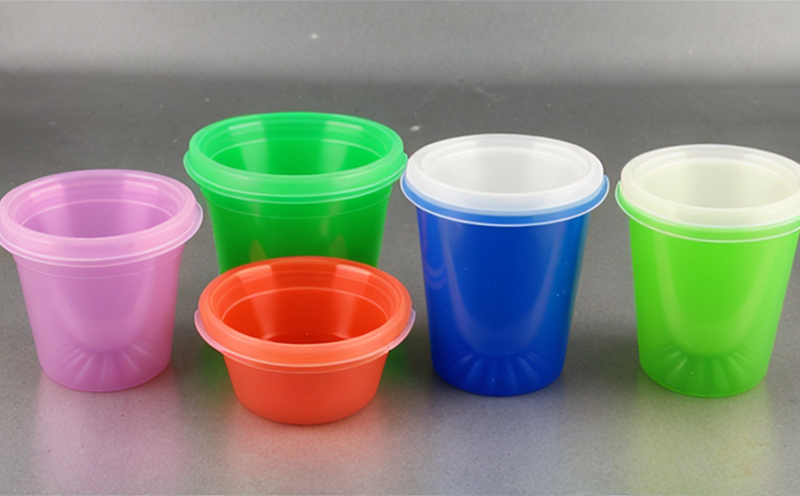ASTM D1894 Coefficient of Friction Testing of Disposable Plastics
The ASTM D1894 standard provides a method for measuring the coefficient of friction (COF) between disposable plastics and various surfaces. This test is particularly important in sectors such as healthcare, consumer goods, and packaging, where slip resistance can significantly impact user safety and product performance.
The COF measurement assesses how easily a material slides across another surface. In the context of disposable plastics, this property is critical for ensuring products like medical gloves, food containers, or personal care items meet stringent safety and performance standards. The test involves placing a specimen on a rotating disc that moves at a controlled speed while in contact with a specified surface. Sensors measure the frictional forces between the two materials.
The coefficient of friction is calculated using the formula μ = F/N, where μ represents the COF, F is the force required to move the specimen relative to the disc, and N is the normal force pressing them together. This test helps determine how a disposable plastic behaves under dynamic conditions, which can vary widely depending on its application.
The ASTM D1894 standard is widely used in industries that rely heavily on friction properties for functionality or safety. For instance, medical gloves need to provide a balance of grip and slip resistance to ensure they neither stick too much nor slide off during use. Similarly, packaging materials must offer enough friction so that they can be handled without slipping but not so much as to cause damage.
Properly conducted COF tests are essential for compliance with international standards such as ISO 21378 and EN ISO 9076. These guidelines emphasize the importance of accurate measurement techniques and environmental controls to ensure consistent results across different testing environments. Understanding these factors allows laboratories to provide reliable data that can influence design decisions, improve product performance, and enhance overall safety.
In practice, specimens are typically cut from larger sheets or rolls according to specified dimensions outlined in ASTM D1894. The choice of surface material—such as rubber, polyethylene, or glass—is crucial because it directly affects the frictional properties being evaluated. Once prepared, the samples are mounted onto a fixture that allows them to rotate against the desired surface under controlled conditions.
The test procedure also specifies temperature and humidity levels to simulate real-world usage scenarios accurately. For example, measuring COF in high-humidity environments can reveal how moisture affects grip, which is especially important for products used in wet conditions like surgical gloves or food containers.
Why It Matters
Understanding the coefficient of friction (COF) of disposable plastics through ASTM D1894 testing is crucial because it influences numerous aspects of product design and performance. Properly designed and manufactured products must balance several factors including safety, functionality, cost-effectiveness, and environmental impact.
- Safety: In healthcare settings, gloves with insufficient grip can lead to slip-and-fall accidents or improper handling during procedures. Similarly, packaging materials that are too slippery might cause damage when being handled or opened.
- Functionality: The right COF ensures optimal performance without compromising user comfort. For instance, in consumer goods like soaps and shampoos, the bottle should not be too slippery to hold but also shouldn't stick too much to prevent spills.
- Cost-effectiveness: Achieving the ideal frictional properties can reduce waste by minimizing material usage while maintaining quality standards. It also helps in optimizing production processes, reducing downtime due to failures or rejections.
By adhering to ASTM D1894 and other relevant standards, manufacturers ensure their products meet regulatory requirements and industry expectations. This not only builds trust with consumers but also enhances brand reputation by demonstrating commitment to quality and safety. Compliance also protects companies from potential legal issues stemming from non-compliant products.
The reliability of COF testing results is vital for businesses operating internationally since many countries have stringent regulations regarding product safety and performance. Testing labs play a key role in providing accurate, repeatable data that can be used to make informed decisions about material selection, process optimization, and quality assurance programs.
Applied Standards
The ASTM D1894 standard is one of several international standards focused on measuring the coefficient of friction. Some other notable standards include:
- ISO 21378:2015 – This ISO standard covers the determination of static and kinetic coefficients of friction for rigid materials using a rotating disc method similar to ASTM D1894.
- EN ISO 9076-2 – Although not directly related to COF testing, this European standard outlines the principles of quality management systems that can be applied during product development and manufacturing processes involving friction tests.
- ASTM D1854 – This ASTM standard specifies procedures for measuring the static and kinetic coefficients of friction between rigid materials using a different apparatus than ASTM D1894 but still provides valuable comparative data when combined with results from other methods.
The choice of which standard to follow depends on factors such as regional regulations, industry practices, and specific material characteristics. For instance, medical devices may require additional certifications beyond just COF testing to comply fully with regulatory bodies like the Food and Drug Administration (FDA) or the European Medicines Agency (EMA).
Benefits
- Increased Safety: Ensures that disposable plastics meet safety standards, reducing risks associated with slip-and-fall accidents or improper handling.
- Better Product Performance: Allows for the optimization of frictional properties to enhance user experience and product functionality.
- Enhanced Compliance: Helps companies comply with international standards and regulations related to product safety and performance.
- Improved Quality Assurance: Provides consistent, reliable data that can be used to improve production processes and reduce defects.
- Cost Reduction: By optimizing frictional properties, businesses can minimize material waste and operational costs associated with rework or scrap.
- Increased Brand Reputation: Demonstrating adherence to strict quality standards builds trust among consumers and stakeholders.
These benefits extend beyond individual products to contribute positively to overall industry practices by fostering innovation, efficiency, and safety across the board.





